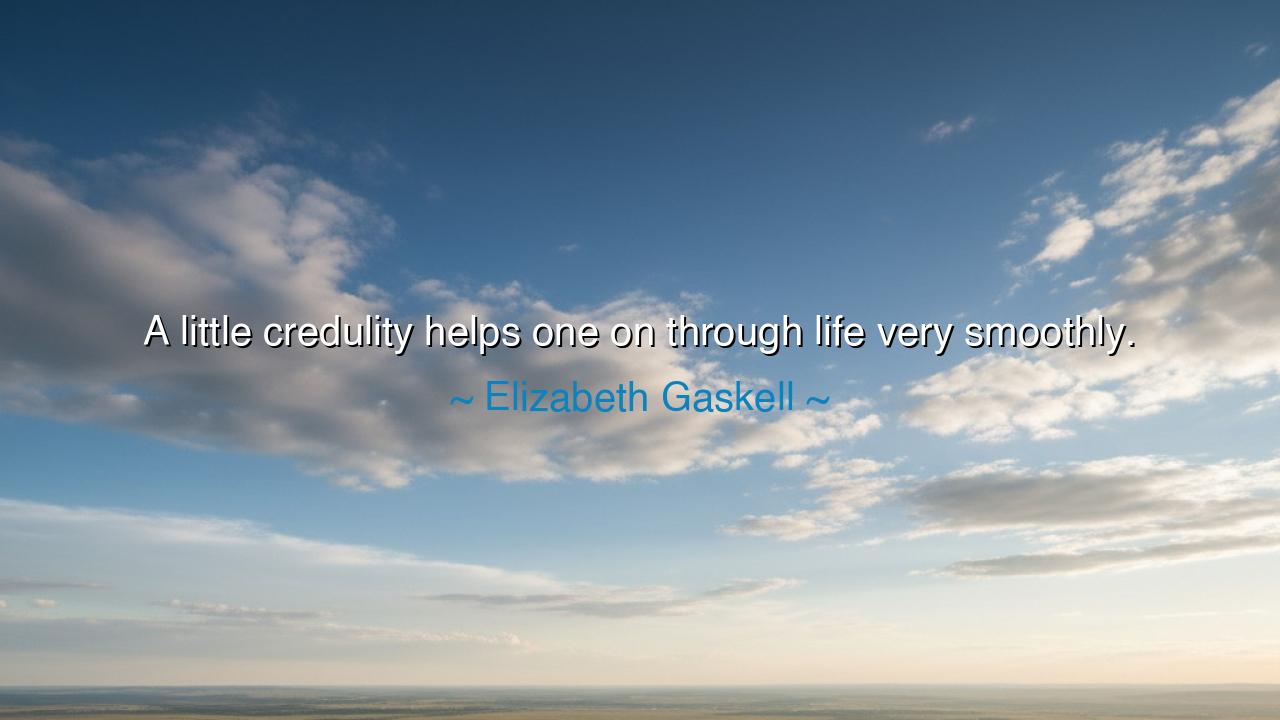
A little credulity helps one on through life very smoothly.






"A little credulity helps one on through life very smoothly." These words spoken by Elizabeth Gaskell suggest a truth that is often overlooked: the role of faith and trust in navigating the journey of life. Credulity, often viewed with suspicion in the world of reason and rationality, is in fact a necessary companion on our path. Gaskell’s insight reflects the idea that without some degree of belief—the ability to trust others, to accept things at face value, and to embrace the unknown—life becomes an arduous and exhausting endeavor. In a world that constantly challenges our assumptions and shakes our beliefs, a little credulity helps us move forward with ease, giving us the grace to trust, to love, and to grow without being paralyzed by doubt.
In the ancient world, credulity was not always seen as weakness, but rather as a form of wisdom. Plato, in his philosophical writings, spoke of the importance of trusting the higher wisdom—whether in the form of the philosopher-king, or in the divine understanding that governed the cosmos. The philosopher's ability to believe in things beyond his immediate perception was key to unlocking deeper truths about life, humanity, and the universe. Credulity, then, can be seen as an opening of the heart to the mysteries of existence, a necessary quality that allows us to find meaning in a world that often eludes our understanding. It is through a willingness to believe, however imperfectly, that we find the courage to engage fully with the world.
Consider the story of Socrates, the revered ancient philosopher. Socrates’ life was one marked by his faith in the power of reason and his trust in the human spirit, but he also exhibited a form of credulity in his belief that others, no matter how lost they seemed, could find wisdom through honest dialogue. Socrates never doubted the inherent potential for truth within each person, and through this credulity, he engaged people of all walks of life, leading them to their own deeper understanding of themselves. While his unwavering faith in humanity was at times criticized, it was also what allowed him to connect with others, to inspire them, and to lead them toward self-awareness. This openness, this believing in the possibility of good, helped Socrates live a life that was impactful and meaningful.
In the case of Alexander the Great, we see a leader who embodied credulity in the form of visionary belief. Alexander believed in his destiny to conquer the world, and this faith in his own mission pushed him to achieve incredible feats. Even when facing seemingly insurmountable obstacles, his credulity in the greatness of his purpose kept him moving forward. Alexander's success was not only due to his military skill, but also to his unshakable belief that he could succeed in uniting the known world under his rule. In this sense, credulity—a form of belief in his own vision—was the fuel that propelled him toward his accomplishments. Had he doubted himself or questioned his destiny, his remarkable conquests might never have materialized.
In the more personal sphere, Jane Austen's characters often display credulity that shapes their emotional journeys. Take Elizabeth Bennet from Pride and Prejudice; though initially skeptical of Mr. Darcy, her growing belief in him—her ability to trust in his character and to forgive his past faults—guides her toward love and happiness. The credulity Elizabeth shows in the face of her personal doubts and misjudgments allows her to overcome obstacles and embrace her future. In this, we see that credulity is not mere naivety, but the strength to trust, to allow ourselves to believe in others, even when we cannot yet see the full picture. Through this faith, Elizabeth finds happiness and personal growth.
The lesson embedded in Gaskell’s words is clear: credulity, or the willingness to believe, is not a weakness, but a strength. It is the ability to engage with the world openly, to trust that there is goodness in others and in the unknown, that allows us to move through life with grace and ease. Without this openness, life becomes a constant battle of skepticism and disbelief, and we are paralyzed by doubt, unable to act or connect with others. Credulity, in this sense, is a gift—the gift of trusting the world enough to embrace it, even with its flaws and uncertainties.
In practical terms, Gaskell’s wisdom invites us to balance our natural skepticism with a measure of faith. While it is essential to question, to reason, and to test our beliefs, we must also allow ourselves to believe—in people, in possibilities, and in love. By embracing a little credulity, we move through the world not as cynical observers, but as active participants in the beauty and complexity of life. So, let us approach each day with an open heart, trusting in the goodness that exists around us, and in doing so, we will find that life flows more smoothly, full of possibility and connection.






AAdministratorAdministrator
Welcome, honored guests. Please leave a comment, we will respond soon